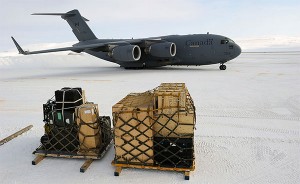Canada claims the North Pole!

A Canadian Forces aircraft lands on the Resolute Bay, Nunavut during Operation NUNALIVUT, a major “sovereignty operation,” in April 2012, demonstrating military capabilities in the far north. Photo: Sergeant Matthew McGregor, Canadian Forces, Creative Commons, some rights reserved
Does any country “own” the North Pole? Might Santa Claus be Canadian?
Those aren’t Christmas-themed trivia questions. Canada is seriously making a case to claim a huge swath of territory at the top of the world. (Except for the Santa part, there isn’t any science to back that up.) And while the Arctic claims garner the most attention, there are also Atlantic Ocean claims for which documentation is available, as in this 52-page executive summary.
The UK’s Guardian reported that Russia’s response included vows to step up their own Arctic military presence. The Wall Street Journal called the North Pole claims “an audacious move“. This is how the Associated Press framed it, as picked up by Fox News:
The U.N. submission is also political, said Michael Byers, an expert on Arctic and international law at the University of British Columbia.
“(Harper) does not want to be the prime minister seen publicly as having surrendered the North Pole, even if the scientific facts don’t support a Canadian claim,” Byers said. “What he’s essentially doing here is holding this place, standing up for Canadian sovereignty, while in private he knows full well that position is untenable.”
On the lighter side, the Telegraph’s Tim Stanley spent more time delving the mystery of Mr. Claus’ nationality and concluded Santa is British.
Getting back to geo-politics, here’s some background from the CBC. After signing an agreement with the United Nations Convention on the Law of the Sea, Canada had ten years in which to file any claim for territory beyond the generally-accepted 200 nautical-mile exclusive economic zone. That deadline fell on Dec 6th, and Canada did make a claim which is why this made the news.
Like it or not, there’s broad interest in the Arctic as a possible region of new shipping lanes and untapped natural resources. As seen in this CBC graphic, neighboring nations with their own territorial claims include Russian, the U.S., Denmark and Norway. The U.S. won’t be making any claims via that particular UN route as it did not sign the convention in question. Again, from the CBC:
Canada could potentially have conflicting claims with Denmark on its border with Greenland and with the U.S. in the Beaufort Sea. But the contentious overlap might be with Russia on the Lomonosov Ridge.
Russia presented its claim to the Commission on the Limits of the Continental Shelf in 2001. That claim ran along the Lomonosov Ridge right up to the North Pole. If Canada has a claim to the Lomonosov Ridge, it could reach 200 nautical miles beyond the pole. That is the halfway point between Canada and Russia.
The UN commission just judges the science and doesn’t have the power to resolve competing claims. Those have to be resolved state-to-state.
The Toronto Star’s Paul Watson wrote a very useful article on the topic, in which he makes a case the claim may be an over-reach of politics over science, one that could easily backfire. He spoke with James Manicom, a research fellow at the Centre for International Governance Innovation in Waterloo about limits to the claim, assuming it ever gets settled:
Once a country’s boundaries over the extended continental shelf are settled, it only has rights to living things on the sea floor and anything under the seabed.
“Other countries can drive ships over it. They can fly over it. They can fish in it. They can fight a war on it,” Manicom said. “It’s a very diluted definition of sovereignty you have with the continental shelf.
“So it’s not really sovereignty. It’s more like sovereign rights, which is an academic distinction, but I think it matters when it comes to politics.”
While Prime Minister Harper has been consistent in pursuing an Arctic vision, some find it overblown. My favorite quip on the topic goes back to the 2008 campaign:
A student at the University of Victoria asked Liberal Leader Stéphane Dion how his policy on Arctic sovereignty differs from that of the Conservatives. Dion replied that a military presence in the Arctic is good but he would not elevate the issue to that of a key central policy the way Conservative Leader Stephen Harper has done.
“If we make it a military issue first, (using the) mentality of the 19th century instead of the mentality of the 21st century, well, we cannot win,” he joked. “Because we cannot win against the Americans, we cannot win against the Russians and we are too civilized to shoot the Danes.”
Here’s another general reaction to Harper’s Arctic vision, from Paul Wells, writing for Maclean’s back in 2010:
In June Michel Rocard, the former French prime minister who is now France’s envoy on Arctic matters, gave a speech in Ottawa where he took note of Canada’s claims to exclusive control and responsibility over a vast territory and seaway in one of the world’s most austere environments. He did not offer a detailed critique of the claim; he couldn’t stop chuckling long enough to come up with one. “Bonne chance avec ça, les amis” was the best he could manage.
But amid so much skepticism, who knows? This move may represent the “nothing ventured, nothing gained” school of thought.
Tags: Arctic, Arctic sovereign, canada, economy, geography, politics








I think we should nuke anyone who claims the North Pole.
But seriously, it should be international with no one being allowed to claim anything beyond the usual territorial limits set for all oceans.